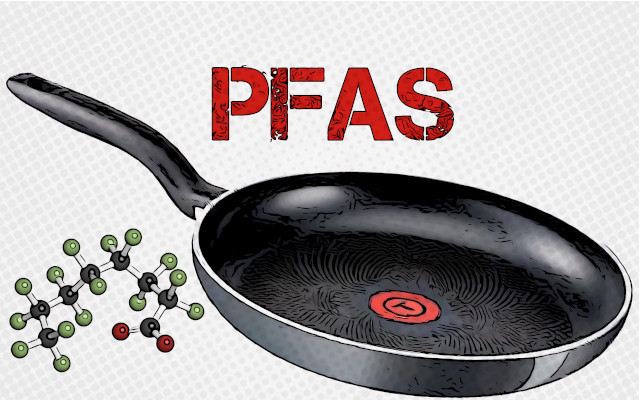The French National Assembly has adopted a bill to ban the use of dangerous PFAS chemicals in clothing, but not in non-stick pans and other items intended to come into contact with food. (1)
France saves PFAS in pans
The bill, filed by the French ecologist deputy Nicolas Thierry, was accepted on 4 April 2024. It provides for a ban on the production, import, export and marketing of cosmetics, wax and clothes (except those for professional use) containing PFAS (poly- and per-fluoroalkyl substances ).
The text also included a ban on the use of PFAS in pans and cooking utensils. However, this part was removed under pressure from the unions of workers employed in French industries that produce pans coated with PFAS (commonly known as Teflon), according to which the measure would threaten jobs.
PFTE in non-stick pans with Teflon
The barter between the health of the population and jobs, to preserve which it would be enough to innovate by giving up toxic chemicals, it is an indigestible compromise for consumers.
‘The Tefal factories of Rumilly (Haute-Savoie) and Tournus (Saône-et-Loire) use a substance from this family, polytetrafluoroethylene (PFTE), to produce pans. PFTE is better known by its trade name, Teflon. Used for its ability to repel water and grease, it has been the subject of suspicion since the late 1990s.
In March 2022, we have identified several other perfluorinated compounds in non-stick pans and regretted the lack of information on the composition of the coatings of these kitchen utensils, given the potential toxic risk they represent‘, comments the French consumer monthly ’60 Millions de Consommateurs’, published by the Institut national de la consommation (INC), the scientific arm of the Ministry for Business, Tourism and Consumption. (2)
Poisoned by PFAS
The PFAS are highly dangerous chemical substances (about 10 thousand different types).
– for the environment, where they persist for a long time (so much so that they are defined as ‘forever chemicals’), polluting water sources and crops, also through pesticides, (3)
– for human health. Exposure of the population through inhalation and consumption of water and food poses serious health risks. One of the PFAS molecules, PFOA, was recently classified by IARC as a human carcinogen, as we have seen. (4) Exposure to various PFAS molecules can also increase the risk of diabetes, damage to the thyroid, liver and immune system, kidney and testicular cancer, and have negative impacts on fertility.
Despite the evidence on their toxicity, PFAS are still used by industry to make a large quantity of everyday objects water-repellent, such as cosmetics, clothing and furnishing fabrics but also products intended for contact with food: baking paper, non-stick pans, packaging food and disposable tableware, such as those identified by recent IPEN analyzes in fast food outlets in 17 countries. (5)
Towards a European ban?
Denmark was the first European Union country to ban the use of PFAS in food packaging in 2020. (6)
The French initiative on PFAS, if confirmed by the Senate, could open a further breach towards the ban on the use of these molecules. Currently, in the European Union
– in 2020, EFSA reduced the acceptable weekly intake to 4 ng/kg body weight for the sum of PFOS, PFOA, PFHxS and PFNA, (7)
– the Commission issued a recommendation 2022/1431 on the collection of data on PFAS in food. Monitor rather than prohibit, (8)
– five EU member states (Denmark, Germany, Holland, Norway and Sweden) at the beginning of 2023 formalized a proposal to revise REACH (Registration, Evaluation, and Authorization of Chemical Substances) Regulation CE No to ECHA (European Chemical Agency) 1907/2006, to restrict the use of approximately 10 thousand perfluoroalkyl substances (PFAS). (9)
Marta Strinati
Footnotes
(1) Proposition of the same, adopted by the National Assembly, designed to protect the population des risques liés aux substances perfluoroalkylées et polyfluoroalkylées, n° 514, delivered on 4 April 2024 and sent to the Commission of land management and sustainable development. National Assembly https://www.assemblee-nationale.fr/dyn/16/dossiers/proteger_population_risques_pfas
(2) The law against external pollutants (PFAS) voted by the Assembly, but without the polls. 60 Millions de Consumers. 5.4.24 https://www.60millions-mag.com/2024/04/05/la-loi-contre-les-polluants-eternels-pfas-votee-par-l-assemblee-mais-sans-les-poeles
(3) Marta Strinati. PFAS in non-organic fruits and vegetables through pesticides. PAN Europe study. GIFT (Great Italian Food Trade). 26.2.24
(4) Marta Strinati. PFAS substances are carcinogenic, IARC confirms. GIFT (Great Italian Food Trade). 3.12.23
(5) Marta Strinati. PFAS, the toxic chemicals in fast-food containers and tableware. IPEN investigation. GIFT (Great Italian Food Trade). 19.12.23
(6) Dario Dongo, Luca Foltran. PFAS, ban in Denmark on MOCAs in paper and cardboard. GIFT (Great Italian Food Trade). 17.9.19
(7) Marta Strinati. PFAS, go to the limits in meat, fish, eggs and other foods of animal origin. GIFT (Great Italian Food Trade). 20.1.23
(8) Dario Dongo, Andrea Adelmo Della Penna. PFAS, furans, glycoalkaloids, Alternaria. The European Commission ‘recommends’ rather than prohibits. GIFT (Great Italian Food Trade). 23.9.22
(9) Dario Dongo. PFAS. The restriction on the use of forever chemicals in the EU is being examined by ECHA. GIFT (Great Italian Food Trade). 23.2.23
Professional journalist since January 1995, he has worked for newspapers (Il Messaggero, Paese Sera, La Stampa) and periodicals (NumeroUno, Il Salvagente). She is the author of journalistic surveys on food, she has published the book "Reading labels to know what we eat".




